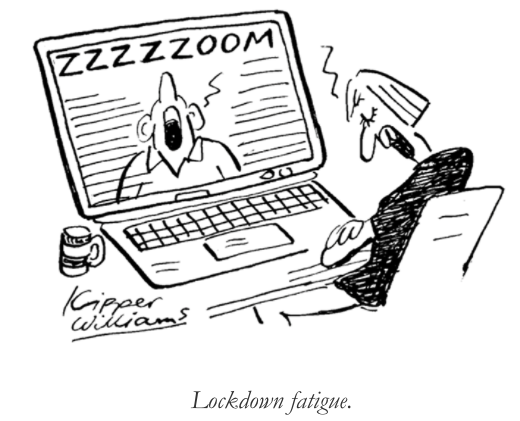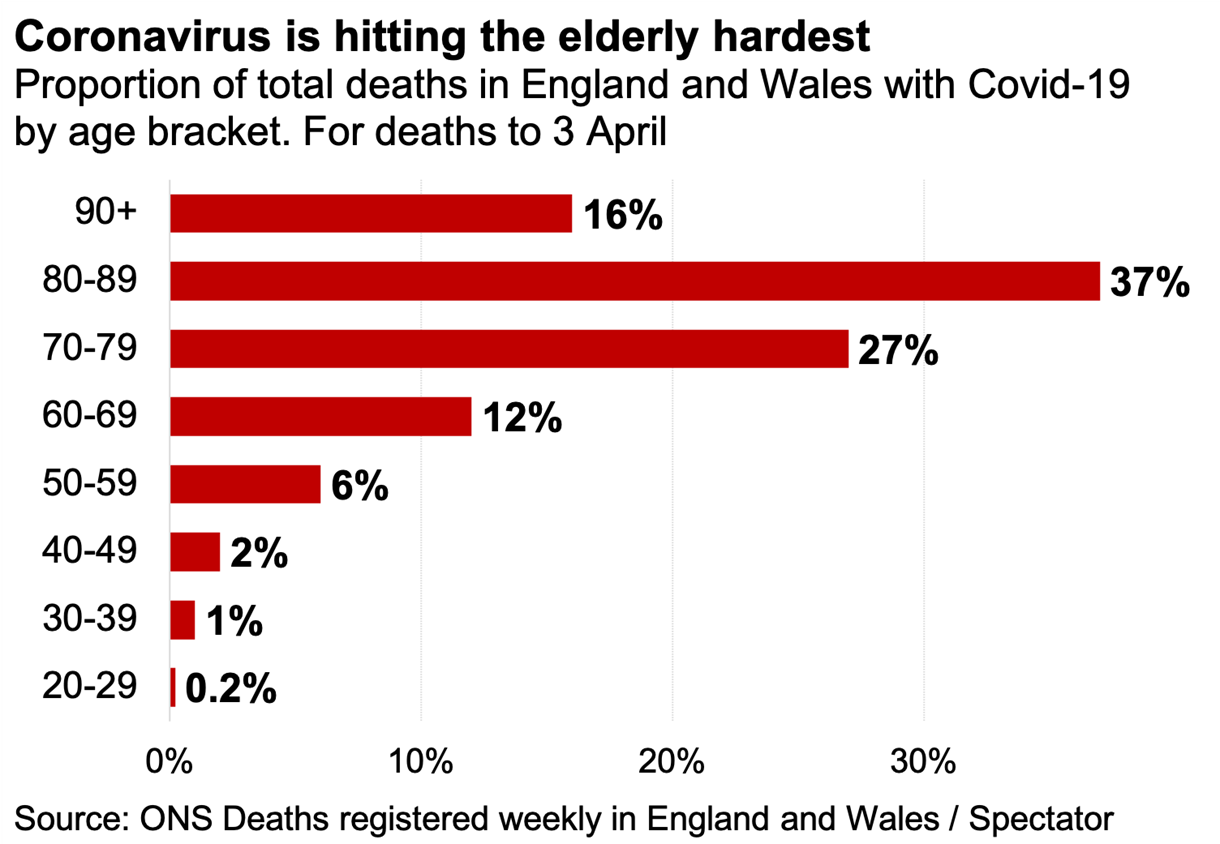The Spectator brings you the latest insight, news and research from the front line. Sign up here to receive this briefing daily by email, and stay abreast of developments both at home and abroad:
News and analysis
- Only one third of school children have taken part in any online lessons since the lockdown began. Analysis below.
- The government will create 30,000 more morgue places, saying it’s a precaution not a prediction.
- The NHS hopes to use blood from Covid-19 survivors in trials to treat patients with the disease, following successful trials in China.
- Stockholm could achieve herd immunity by May, according to a study. Details below.
- A random test of 200 people in Boston found that 32 per cent had Covid-19 antibodies, suggesting they had already been infected with the virus. Ross Clark has the details on Coffee House. A far-larger test in California found 2 per cent to 4 per cent.
- 36,000 Brits have applied to work on UK farms – but only 112 have finalised contracts.

Only a third of children are given online learning
Schools ‘return’ in the UK today, but a study from the Sutton Trust shows that only one in three children has taken part in online learning courses since the lockdown began. As Fraser Nelson predicted in his Telegraph column a few weeks ago, children from poorer backgrounds are falling behind. Well-resourced private schools have comprehensive week-long plans and even an 8.30 a.m. virtual roll-call with punishments for lateness. According to the Trust, between 51 per cent and 57 per cent of private pupils have accessed online lessons every day ‘compared to just 19 per cent of state primary and 22 per cent of state secondary students’. Children from disadvantaged backgrounds are supposed to get free laptops, tablets and 4G routers as the government launches ‘virtual schooling’ this week, but as James Kirkup says on Coffee House, these can only go so far to balance the inequality as the lockdown continues. The economy will rebound, but educational damage can be permanent. Norway, the only country to have conducted a holistic assessment of school closures, released a study last week showing how every week of absence can permanently stymie the life chances (and earnings potential) of children affected. As Rod Liddleobserves, lockdown hits the poorest hardest.
In words
I wasn’t there so can’t say if I would have dissented if I’d been there to hear the arguments. I generally think that you accept collective responsibility even if you are absent because you’ve chosen to be somewhere else.
– Peter Openshaw, professor of experimental medicine at Imperial College, also referenced in the Sunday Times as someone who would have ‘recommended increasing the threat (level) to high’.

Global news
- China has used emergency pandemic rules to arrest 15 people in Hong Kong accused of being involved in anti-government protests.
- New York Governor Andrew Cuomo declared that New York state is ‘past the high point’; meanwhile, NYC mayor Bill de Blasio has encouraged people to use an appto inform on those violating his lockdown rules.
- The FBI says cyber crime has quadrupled during the pandemic. Much of the increase has been from foreign nations seeking Covid-19 research.
- More countries are beginning to ease their lockdowns, as small shops and schools open in Germany along with three beaches in Sydney.
- The last three cruise ships in the world still at sea will dock today.
- New Zealand will lower its Covid-19 threat level in a week’s time.
- 59 people have been arrested following attacks on health workers and authorities in Bengaluru, India, following rumours that people were being taken from the quarantined area.
- More than 2,000 Israelis observed social-distancing in protesting against Benjamin Netanyahu.
Research
A report from today’s Svenska Dagbladet suggests Stockholm could achieve herd immunity by May. Two weeks ago, Professor Tom Britton concluded that Sweden would reach the peak of the virus spread in April. This seems to have happened. Now, the Stockholm statistics professor has published a detailed study estimating that about a third of the capital’s residents carry (or have carried) the virus and that herd immunity – when around 60 per cent are sick or have become immune – could be achieved next month. ‘In a month’s time, we might be around 50 per cent. When half of the inhabitants have or have had the virus, the spread becomes slower.’ He has only studied the situation in Stockholm, and the rest of the country has not had the same spread. In most places, herd immunity may be further away.
In data

Coronomics
- A study from Goldman Sachs claims that energy-related carbon emissions will fall by at least 5.4% this year – the largest on record.
- Internal HM Treasury reports predict a slower U-shape recovery with permanent consequences. The Treasury also estimates that nearly 12 million people in the UK could lose their jobs in the next three months.
- 67,000 claims from employers have been made in the first 30 minutes of the government’s furlough scheme going live. The Resolution Foundation estimates that eight million workers could be furloughed over the coming weeks.
- US oil prices have reached a 21-year low, as the Covid-19 lockdown has resulted in a huge slump in demand.
- An economic adviser to the government has warned that the lockdown needs to be ended in ‘three to four weeks’, due to damage to business, people’s mental well-being, and the disproportionate effects on the most vulnerable and disadvantaged.
- France has lost €120 billion in economic activity over the last eight weeks of lockdown; meanwhile, the French Labour Minister Muriel Pénicaud revealed 9.6 million workers are also at least partially unemployed during the lockdown.
- American fiscal support during the Covid-19 outbreak is now larger than during the first world war and the Great Depression.
Our latest podcast
More from The Spectator
Britain’s corona cops are both absurd and terrifying –Tom Slater
Will Sweden’s social distancing-lite work? – Ross Clark
Did the government really ‘brush aside’ coronavirus fears in January? – Steerpike
Do face masks work? A note on the evidence – Dr John Lee
Don’t bank on a V-shaped recovery – John Keiger






Comments